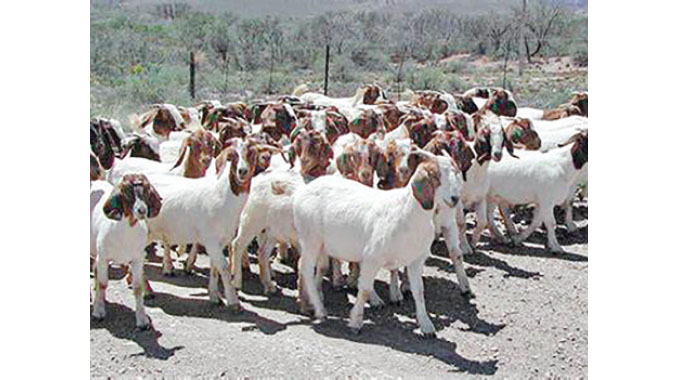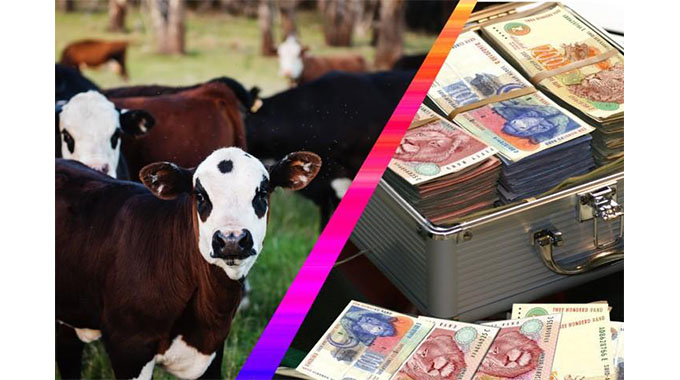Sustainable use of natural resources in rural communities can sustain the environment’s natural components

Mahlabezulu Zulu, Correspondent
LACK of knowledge on sustainable use of natural resources in rural communities can destroy the environment’s natural components.
Some communities are lucky to have livelihood and ecologically supportive centres through livestock, crops and natural resources.
Chidobe Dairy Goat Project for the Chidobe community in Hwange District is one such centre. It promotes livelihoods through conservation of natural resources and rearing of high quality goats to improve milk production and chevon, that is, goat meat.
Like any other goat keeping rural communities in Zimbabwe, Chidobe community has suffered devastating effects of inbreeding which include weaker traits like less milk production, poor quality meat, undesirable temperament, less disease resistance, high mortality and stunted growth.
The project recently organised a workshop which was attended by 40 goat rearing participants and the local leadership which included councillors and Hwange West MP, Mr Godfrey Dube.
A goat expert and director of Mzilikazi Kalahari Red Goat Stud which is based in Umguza, Mr Chris Grant, was the main presenter at the workshop.
He encouraged participants to maximise on goat rearing saying they can realise lucrative returns from the business.

lobola
The value of livestock kept by most rural communities is pegged according to social use like paying lobola, provision of draught power, quantity of meat, milk, manure and skin. Cattle have most of the foregoing social and economic characteristics.
Mr Grant, who has extensively travelled the country sharing his knowledge of goat rearing said prices of goats in some parts of the country are pegged at US$150 or more while in others, they are as low as US$20.
A participant asked why the price range was so wide, and how local buyers could be convinced to accept higher prices.

In his response, Mr Grant said:
“The value of a goat, like any commodity being sold is determined by body size, breeding habit, being prolific, disease resistance and general appearance. These are possible if goat keepers adopt good practices like animal husbandry, feeding, housing and cross breeding with good breeds from other parts of the country.”
To promote quality, and for the benefit of the community in terms of goat keeping, the participants were advised to see beyond the horizon when it comes to seeking desirable genetic pools through networking with other well-known goat keepers who have good breeds in different parts of the country.
Trees play a vital role in our lives like for medicinal purposes, food or habitats of insects like bees which provide us with honey. Tree species like Large False Mopane/Umtshibi/Mchibi have been known for biological control of fleas, the leaves are harvested and spread in fowl runs, while mature dry pods of trees like Snake Bean Tree/Umkejekeje/Mucherekese have been pounded, and the powder used as an alternative to antibiotics for treating some chicken diseases. In most cases encouraging communities to conserve natural resources for human benefit has been like crying to the moon, as communities are not aware of these benefits.

fowl run
This came to light when workshop participants learnt about a nutritious supplementary goat meal feed called “bush meal’’ which comprises ingredients from parts of different tree species also found in Chidobe communal area, which include Sickle Bush/Ugagu/Mumhangara and Monkey Bread/ Ihabahaba/Mubaba and some Acacia/Amawohlo/Muchanga or Chinanga tree. Ecologically, these tree species fix nitrogen into the soil, and their mature pods contain both calcium and protein which are important for the growth of animals.

Sickle Bush
During the workshop, participants were encouraged to promote planting of such trees for cost-effective livestock feed, like the “bush meal”.
They were also taught on growing and preserving other plant species, even though they are exotic but have high content of protein, when processed and incorporated in home prepared meals that can improve milk or egg production. Participants learnt how to treat various goat parasites like worms and diseases like roundworm and tick-borne heart water common in different parts of the country.
Local leadership and community members welcomed the move by Chidobe Dairy Goat Project for holding the workshop. They said such interactions can help improve their livelihoods through keeping livestock.

roundworm
Mr Dube said: “This is an encouraging event. It’s a step in the right direction by the project in improving our communities promoting livestock keeping and improving the environment.”
The MP pledged to promote more such projects.
Ms Regina Sibanda, a villager promised to share what she learnt about formulating goat meals from parts of trees with fellow villagers with much attention on the survival of rare tree species like acacia.
l Mahlabezulu Zulu is a conservationist who has worked for various wildlife research, and conservation organizations in Hwange National Park, and Fuller Forestry in Victoria Falls. He can be contacted on 00263(0)713269827/0776196171. Email [email protected]










Comments